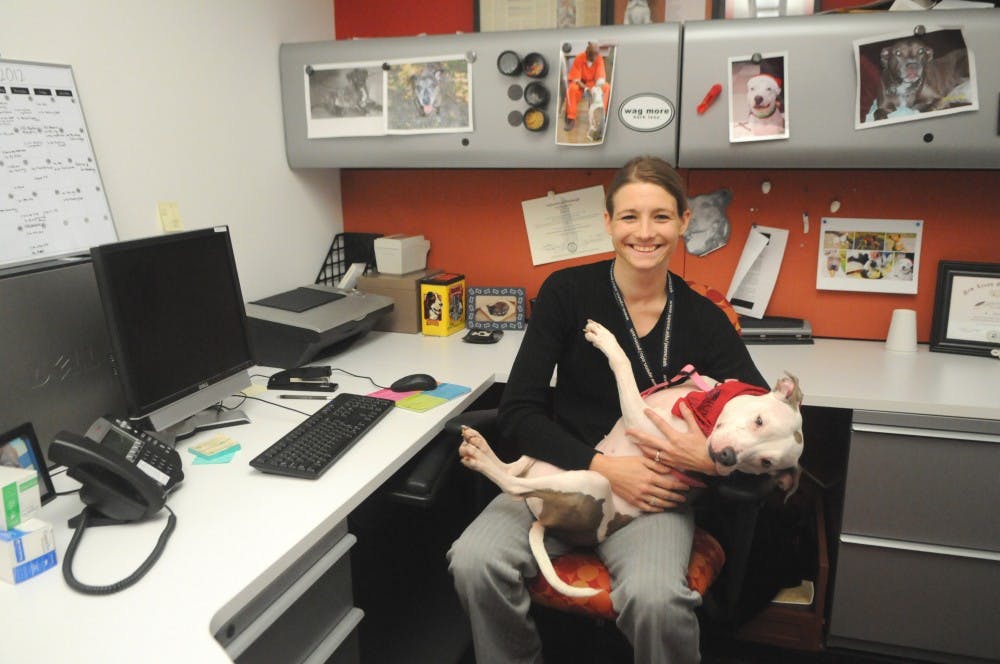After committing to treat her 11-year-old Staffordshire Terrier mix dog Cleopatra for lymphoma in 2009, Michele Pich spent a lot of time in the waiting room at Penn’s Ryan Veterinary Hospital.
A few months later, her friend Lois Schaeffer received a similar diagnosis for her own Staffordshire Terrier mix dog, Casey.
While in the waiting room at Penn’s Ryan Veterinary Hospital, Pich and Schaeffer would both talk to other people, many of whom also had dogs undergoing chemotherapy for lymphoma.
“I told Michele, ‘you know what, this is so therapeutic,’” Schaeffer said.
Through her interactions in the waiting room, Pich, who has a degree in clinical psychology, realized that her talents might allow her to help grieving pet owners in a more formal setting.
At the time, Ryan Veterinary Hospital had offered various forms of pet loss bereavement services since the 1980s, but there had been no one on the job for several months.
Pich proposed her vision for reinstating a veterinary grief counseling service at the hospital, and around April 2010 she became Penn’s veterinary grief counselor and led her first Pet Loss Support Group meeting.
She also started a new support group aimed at helping those caring for chronically ill, terminally ill or aging pets.
The new group was named “Cleo’s Group” after Pich’s dog, who at the time was still receiving treatment and doing well.
“I joke that I got the job because my boss met my dog first and fell in love with her,” Pich said.
Pich believes veterinary grief counseling is “a needed area,” since those coping with the loss of a beloved animal frequently encounter criticism from people in their lives who consider being upset about a dead or dying pet to be foolish.
“At church, people would tell me not to grieve because animals don’t have souls,” said Michael Shiomos, who started attending the Pet Loss Support Group following the deaths of his cats, Muffin and Butterscotch.
Much of the work Pich does now, she explained, is very similar to what she used to do when counseling cancer patients and their relatives.
In fact, she said that in the case of pets, there is an added level of nervousness on the part of the caregiver about making the right decisions, since animals cannot verbalize their will or clearly communicate pain.
In addition to running monthly meetings for each support group, Pich also gives public lectures on the subject and provides individual counseling for pet owners in person, on the phone and in the waiting room at the hospital.
Additionally, in order to accommodate the increasing number of people seeking her help, Pich has been training School of Veterinary Medicine students to operate a “Pet Loss Hotline” starting this month.
Through her counseling, Pich helps pet owners — free of charge — to fully comprehend treatment options presented by their veterinarians, while others seek her advice on what to do with the remains of their animals. Occasionally, she is even present during euthanasia.
“Sometimes you need a sort of ‘permission’ to say goodbye,” she said.
For pet owners who have children, she highlights the importance of reassuring them that the death is not due to anything they have done wrong.
She also suggests avoiding euphemisms such as “putting to sleep.”
“Kids find meaning to things differently,” she said.
During the support group meetings, members sit around a table and work through their deeply personal grief by sharing stories, pictures and mementos.
“Some nights we were there until midnight from seven o’clock,” Schaeffer said.
Shiomos tries to come as often as he can.
“It’s amazing how comfortable I feel,” he said. “Michele even brings snacks.”
In Cleo’s Group, Pich deals with the “anticipatory grief” experienced by those with ill or aging pets, helping them find a balance between making the most out of the time their pet has left and preparing for when they will no longer be there.
Most members who attend the meetings are dog and cat owners, although some seek support after losing non-traditional pets such as rats, lizards, snakes, birds or rabbits.
Pich herself lost a leopard gecko named Sheila two months after losing Cleo — a story she often shares during the meetings.
The account of Sheila’s death also serves as an example of how one loss can trigger emotions related to a previous loss, adding complexity to the grieving process.
“People can make progress and experience setbacks, but ultimately find a way to heal through it all,” she said.
Cleo died last year, 23 months after her initial diagnosis.
Since then, Pich has adopted a therapy dog named Vivian Peyton — who sometimes “helps out” during the sessions.
Cleo remains an inspiration for Pich today, and a statue of her — which Pich carved out of alabaster — sits in her office at the hospital.
“I sometimes bring it to the group meetings as a reminder that we can say goodbye to the animals we love and have lost, but they are not forgotten,” she said.



